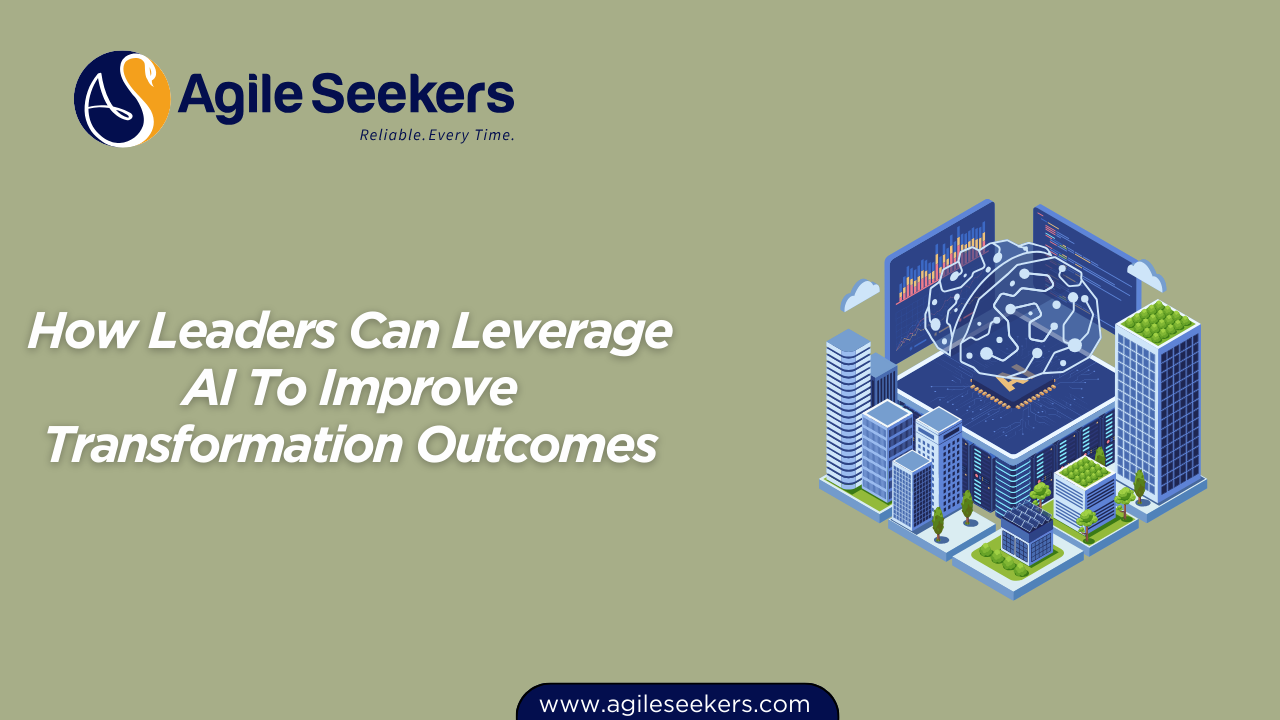How Leaders Can Leverage AI To Improve Transformation Outcomes

Organizational transformation is never easy. Leaders carry the weight of aligning strategy, culture, technology, and execution. What often gets overlooked is how much time and energy is wasted on guesswork, unclear priorities, and outdated practices. This is where Artificial Intelligence steps in—not as a buzzword, but as a practical partner that helps leaders deliver real outcomes.
Why Leaders Struggle With Transformation
Before diving into AI’s role, let’s call out the challenges leaders face when driving change:
-
Unclear visibility: Data is scattered, making it difficult to see the full picture of performance.
-
Slow decision-making: Leaders rely on manual reporting cycles that delay critical insights.
-
Resistance to change: Teams hesitate to adapt when the benefits aren’t clear or immediate.
-
Measuring impact: Many leaders lack reliable ways to track whether transformation is working.
These issues cause transformation fatigue. Leaders need sharper tools to cut through complexity—and that’s exactly where AI creates leverage.
AI as a Decision Accelerator
AI turns raw data into actionable insights. Instead of waiting for end-of-quarter reports, leaders can see trends in real time. For example, predictive analytics highlight whether a new process will reduce cycle time before it’s fully rolled out. This gives leaders the confidence to act faster while minimizing risks.
Leaders who want to deepen their expertise in this space can explore the AI for Agile Leaders and Change Agents Certification. It’s designed to help decision-makers use AI tools not just for analysis but for steering large-scale change.
Personalizing the Change Journey
One of the toughest parts of transformation is managing people. Traditional change models treat teams as one-size-fits-all. AI, on the other hand, helps leaders tailor experiences. Sentiment analysis from feedback tools, for instance, can surface early signs of disengagement. AI-driven coaching apps suggest learning paths aligned with each team member’s needs.
External research backs this up. According to a Harvard Business Review article on AI adoption, organizations that use AI to complement human judgment see higher adoption rates and stronger cultural alignment.
Improving Portfolio and Program Outcomes
Transformation isn’t just about culture; it’s also about execution at scale. AI can:
-
Forecast delivery timelines with greater accuracy.
-
Detect portfolio bottlenecks before they derail investments.
-
Highlight which initiatives align best with business outcomes.
For project leaders, the AI for Project Managers Certification Training provides practical skills to apply AI in managing risks, dependencies, and stakeholder communication. This creates a direct link between portfolio decisions and measurable results.
Enhancing Product Leadership
Transformation succeeds when customers feel the impact. AI equips product leaders with sharper customer insights, helping them prioritize features that actually drive value. Tools like AI-driven market analysis or customer behavior prediction allow faster pivots, reducing waste on low-impact initiatives.
If you’re a product professional aiming to lead in this space, the AI for Product Owners Certification Training teaches how to apply AI to backlog refinement, customer feedback analysis, and roadmap alignment.
AI for Agile Teams and Scrum Masters
Leaders don’t drive transformation alone. Scrum Masters and Agile Coaches play a huge role in sustaining momentum. AI helps them:
-
Track team health using behavioral analytics.
-
Suggest retrospective improvements based on past sprint data.
-
Monitor flow efficiency and predict blockers before they hit.
Training such as the AI for Scrum Masters Certification prepares facilitative leaders to integrate AI dashboards, predictive metrics, and coaching insights into everyday Agile practices.
Measuring What Really Matters
Transformation outcomes often get judged by vanity metrics like “number of workshops conducted” or “percentage of tools adopted.” AI shifts the focus toward impact:
-
Throughput and flow efficiency: How quickly value moves from idea to customer.
-
Employee engagement signals: Early warnings of burnout or disengagement.
-
Customer sentiment trends: Direct correlation between transformation and customer loyalty.
McKinsey research on AI in transformation success rates shows that organizations using AI-backed measurement frameworks are more likely to sustain improvements over time.
Leading With Confidence, Not Guesswork
Here’s what it really comes down to: AI helps leaders replace assumptions with evidence. Instead of making decisions based on instinct alone, leaders can blend experience with real-time insights. This not only improves transformation outcomes but also builds credibility with teams and stakeholders.
Final Thoughts
Transformation is complex, but it doesn’t have to be chaotic. Leaders who embrace AI gain clarity, speed, and adaptability—qualities that separate successful transformations from stalled ones. Whether you’re a senior executive, a program manager, or a product leader, there’s a growing expectation that you understand how AI shapes change.
Investing in AI-driven leadership skills through certifications like those offered at AgileSeekers isn’t just about personal growth—it’s about ensuring your organization thrives during change.
Also read - Building High Performing Teams With AI Powered Agility
Also see - The Role Of AI In Predictive Analytics For Agile Decision Making




















